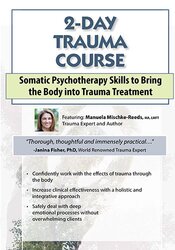

Our minds are inescapably connected to our bodies—and treating trauma separate from your clients’ psychophysical experiences can leave a vital aspect of their suffering unaddressed, negatively impacting outcomes.
Mounting evidence tells us that Somatic Psychotherapy may be the future of successfully healing the entire person in the treatment of trauma and stress disorders.
This groundbreaking recording is your go-to resource for incorporating somatic techniques into your daily clinical practice. Learn when and how to apply somatic psychotherapy approaches with tips and tools that will allow you to read the body in distress and assess your clients’ readiness to apply somatic techniques. Detailed guidance on using safe and highly-effective somatic skills will enable you to confidently work with trauma in the body and help your clients deal with deep emotional processes without overwhelming them.
Walk away from this workshop with:
Discover how you can take trauma treatment to the next level with somatic tools and techniques to treat the whole client – body and mind!
| File type | File name | Number of pages | |
|---|---|---|---|
| Manual - 2-Day Trauma Course: Somatic Psychotherapy Skills to Bring the Body into Trauma Treatment (3.9 MB) | 53 Pages | Available after Purchase | |
| Handout - Updated Slides (30.6 MB) | 55 Pages | Available after Purchase | |
| Handout - Updated Slides - French (30.6 MB) | 55 Pages | Available after Purchase | |
| Manual - 2-Day Trauma Course: Somatic Psychotherapy Skills to Bring the Body into Trauma Treatment - French (3.9 MB) | 53 Pages | Available after Purchase | |
| Handout - Updated Slides - Italian (30.6 MB) | 55 Pages | Available after Purchase | |
| Manual - 2-Day Trauma Course: Somatic Psychotherapy Skills to Bring the Body into Trauma Treatment - Italian (3.9 MB) | 53 Pages | Available after Purchase | |
| Handout - Updated Slides - German (30.6 MB) | 55 Pages | Available after Purchase | |
| Manual - 2-Day Trauma Course: Somatic Psychotherapy Skills to Bring the Body into Trauma Treatment - German (3.9 MB) | 53 Pages | Available after Purchase | |
| Handout - Updated Slides - Spanish (30.6 MB) | 55 Pages | Available after Purchase | |
| Manual - 2-Day Trauma Course: Somatic Psychotherapy Skills to Bring the Body into Trauma Treatment - Spanish (3.9 MB) | 53 Pages | Available after Purchase |

Manuela Mischke-Reeds, MA, LMFT, CHT, is a somatic psychotherapist, international teacher of Somatic Psychology, author and consultant. She is the founder of Embodywise and co-director of Hakomi California. She trains and consults professionals in varied fields, including health professionals and business leaders. Her trainings in the United States, Australia, Germany, China and Israel bring together 25 years in-depth clinical practice and teaching. She integrates Hakomi Mindful somatic Psychotherapy, Somatic trauma therapies, embodied mindfulness practices and movement therapies.
Manuela is the founder of ISITTA trauma training. Her trauma teachings are grounded in an inside-out approach that utilizes the depth of the body’s innate healing capacity.
Manuela is the author of several books, including 125 Somatic Psychotherapy tools for Trauma and Stress (PESI 2018), 8 Keys to Practicing Mindfulness: Practical Strategies for Emotional Health and Well Being (W.W. Norton 2015). Visit Manuela’s website to find out more about her work: www.embodywise.com.
Speaker Disclosures:
Financial: Manuela Mischke-Reeds is the founder of Embodywise and has an employment relationship with Embodylab. She receives compensation as a consultant and royalties as a published author. She receives a speaking honorarium, recording, and book royalties from PESI, Inc. She has no relevant financial relationships with ineligible organizations.
Non-financial: Manuel Mischke-Reeds has no relevant non-financial relationships.
The Essentials of Trauma, Stress, PTSD and Complex PTSD
Somatic Perspective of Trauma and Stress Symptoms
Somatic Psychotherapy Fundamentals for Working with Trauma in the Body
Evidence-Based Therapeutic Approaches That Work with the Body
The Somatic Psychotherapy Toolbox: Interventions for Enhanced Effectiveness in Trauma Treatment
Vicarious Trauma: What Clinicians Need to Know
Put It to Practice: Demonstrations of Somatic Therapy Skills
Please wait ...